 11 citations,
September 2019 in “Dermatologic Surgery”
11 citations,
September 2019 in “Dermatologic Surgery” A substance called Vascular Endothelial Growth Factor can protect certain hair follicle stem cells from damage caused by androgens, suggesting a new possible treatment for hair loss.
4 citations,
January 2016 in “Methods in molecular biology” Hair follicle stem cells can become nerve cells using specific treatments.
 235 citations,
January 2011 in “Journal of Clinical Investigation”
235 citations,
January 2011 in “Journal of Clinical Investigation” Men with baldness due to androgenetic alopecia still have hair stem cells, but lack specific cells needed for hair growth.
 April 2011 in “Faculty Opinions – Post-Publication Peer Review of the Biomedical Literature”
April 2011 in “Faculty Opinions – Post-Publication Peer Review of the Biomedical Literature” Bald men with male pattern baldness still have hair stem cells, but lack certain cells needed for hair growth.
 January 2011 in “Faculty Opinions – Post-Publication Peer Review of the Biomedical Literature”
January 2011 in “Faculty Opinions – Post-Publication Peer Review of the Biomedical Literature” Bald men with male pattern baldness still have hair stem cells, but lack certain cells needed for hair growth.
 January 2011 in “Faculty Opinions – Post-Publication Peer Review of the Biomedical Literature”
January 2011 in “Faculty Opinions – Post-Publication Peer Review of the Biomedical Literature” Bald men with male pattern baldness still have hair stem cells, but lack certain cells needed to grow hair.
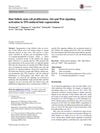 30 citations,
February 2017 in “Histochemistry and Cell Biology”
30 citations,
February 2017 in “Histochemistry and Cell Biology” TPA promotes hair growth by increasing stem cell activity and activating specific cell signals.
 53 citations,
April 2014 in “Experimental Dermatology”
53 citations,
April 2014 in “Experimental Dermatology” Wnt10b makes hair follicles bigger, but DKK1 can reverse this effect.
 106 citations,
March 2014 in “BioEssays”
106 citations,
March 2014 in “BioEssays” We need more research to better understand human hair follicle stem cells for improved treatments for hair loss and skin cancer.
 6 citations,
November 2020 in “Molecular and Cellular Endocrinology”
6 citations,
November 2020 in “Molecular and Cellular Endocrinology” Androgens reduce BMP2, which weakens the ability of certain cells to help hair stem cells become different types of cells.
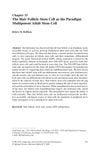 1 citations,
January 2008 in “Springer eBooks”
1 citations,
January 2008 in “Springer eBooks” Hair follicle stem cells can turn into many cell types and may help repair nerve damage and have other medical uses.
 88 citations,
July 2019 in “International Journal of Molecular Sciences”
88 citations,
July 2019 in “International Journal of Molecular Sciences” Using human fat tissue derived stem cells in micrografts can safely and effectively increase hair density in people with hair loss.
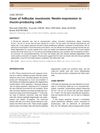 1 citations,
July 2009 in “Journal of dermatology”
1 citations,
July 2009 in “Journal of dermatology” A 29-year-old man had a jaw plaque diagnosed as follicular mucinosis, linked to nestin-positive hair follicle stem cells.
 March 2024 in “Journal of functional foods”
March 2024 in “Journal of functional foods” Collagen peptides from marine and bovine sources may help prevent hair loss by affecting hair follicle stem cells differently.
 22 citations,
October 2018 in “Aesthetic Plastic Surgery”
22 citations,
October 2018 in “Aesthetic Plastic Surgery” Understanding hair follicle biology and stem cell control could lead to new hair loss treatments.
 July 2023 in “Regenerative Therapy”
July 2023 in “Regenerative Therapy” Stem cell and platelet-rich plasma therapies show promise for COVID-19 related hair loss, but more research is needed.
 72 citations,
July 2012 in “Journal of Investigative Dermatology”
72 citations,
July 2012 in “Journal of Investigative Dermatology” Mice lacking a key DNA methylation enzyme in skin cells have a lower chance of activating stem cells necessary for hair growth, leading to progressive hair loss.
 September 2023 in “International Journal of Trichology”
September 2023 in “International Journal of Trichology” Adipose-derived stem cells may help with hair loss, but more research is needed.
 January 2022 in “Stem cell biology and regenerative medicine”
January 2022 in “Stem cell biology and regenerative medicine” Stem cell therapies show promise for hair regrowth but need more research to confirm effectiveness.
 96 citations,
July 2014 in “Cold Spring Harbor Perspectives in Medicine”
96 citations,
July 2014 in “Cold Spring Harbor Perspectives in Medicine” The document concludes that adult mammalian skin contains multiple stem cell populations with specific markers, important for understanding skin regeneration and related conditions.
 1 citations,
February 2021 in “Journal of Natural Remedies”
1 citations,
February 2021 in “Journal of Natural Remedies” Ficus religiosa and Morus alba extracts improved hair growth and follicle regeneration in mice.
5 citations,
February 2022 in “Stem cell reports” Thymic stromal lymphopoietin (TSLP) promotes hair growth, especially after skin injury.
 38 citations,
June 2017 in “The Journal of Dermatology”
38 citations,
June 2017 in “The Journal of Dermatology” Aging in hair follicle stem cells leads to hair graying, thinning, and loss.
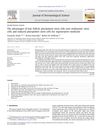 33 citations,
October 2010 in “Journal of Dermatological Science”
33 citations,
October 2010 in “Journal of Dermatological Science” Hair follicle stem cells are a practical and ethical option for nerve repair in regenerative medicine.
 95 citations,
May 2012 in “British Journal of Dermatology”
95 citations,
May 2012 in “British Journal of Dermatology” Androgens block hair growth by disrupting cell signals; targeting GSK-3 may help treat hair loss.
 14 citations,
July 2019 in “Experimental and Molecular Medicine”
14 citations,
July 2019 in “Experimental and Molecular Medicine” Nanog gene boosts stem cells, helps hair growth, and may treat hair loss.
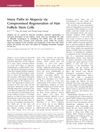 8 citations,
May 2013 in “Journal of Investigative Dermatology”
8 citations,
May 2013 in “Journal of Investigative Dermatology” Different problems with hair stem cell renewal can lead to hair loss.
 242 citations,
February 2016 in “Science”
242 citations,
February 2016 in “Science” Hair loss and aging are caused by the breakdown of a key protein in hair stem cells.
 69 citations,
April 2019 in “Biomedicines”
69 citations,
April 2019 in “Biomedicines” PRP and HF-MSCs treatment improves hair growth, thickness, and density in androgenetic alopecia.
 47 citations,
October 2016 in “Molecular and Cellular Endocrinology”
47 citations,
October 2016 in “Molecular and Cellular Endocrinology” Androgens prevent hair growth by changing Wnt signals in cells.



























